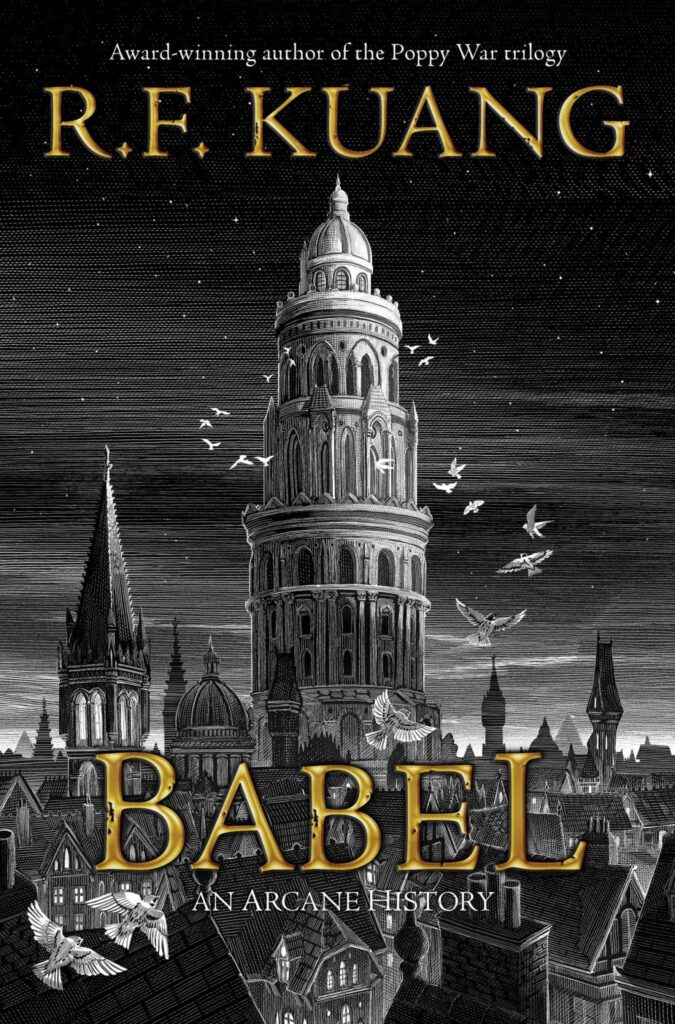Babel is a historical fantasy novel set in 1830s Oxford (primarily), London, and Canton, China. At its heart is a magical system that involves inscribing silver bars with a word in a foreign language and its (imperfect) English translation. The gap in the meaning between the two words, as felt by the fluent translator who speaks them, is what gives rise to the magical effect.
It’s a very clever conceit and, as someone who has studied a number of languages, something that feels like it could be magic. There’s a tension between a word used in a different time or place and its necessarily imperfect English translation — some nuance lost from the original, some slight mutilation of the meaning. It’s unavoidable.
If I had a bone to pick, it would be that the words-inscribed-on-silver magic seems like it should be only one part of a more complex magical system. Surely in a world where words have such power, there is something more fundamental at work which would allow other sorts of magic: arcane spells, magical creatures, divination, elemental magic, etc. But not in this case: It’s just translated words on silver.
But maybe that is a necessary constraint, because the other fundamental part of this story is what that particular magical system implies for the British empire. While the silver bars can be used for healing, they are more often treated as luxury items available only to those who can pay. The limitless British hunger for silver means they need to find new sources abroad. Ditto the invaluable native speakers who can imbue the bars with meaning and magic.
So that is the context in which our protagonist, Robin Swift, exists. Born in Canton but “rescued” from the Cholera epidemic sweeping through China at the time by an Oxford translation professor, Robin is raised in England and tutored relentlessly in order to join the ranks of “babblers” at Oxford — scholars whose job it is to become deeply fluent in their chosen languages in order to discover new “match-pairs” of words that will generate new and profitable magical effects.
The best part of this book, for me, was how instructive it was about colonialism. The British elites saw the project of colonialism as fundamental to dominating the other European powers and the upstart Americans. It was a contest of power and they would not hesitate to extract whatever they needed — resources, wealth, people — from their colonial holdings. Far from being considered collateral damage, their subjects in the colonies were, in their eyes, irredeemably barbaric and not worthy of a second thought. Sub-human. Only those with a knack for languages were valuable, but they were not people, they were tools.
A corollary to this is the seeming inability of white Britons to recognize this exploitative relationship for what it is. On the contrary, their attitude is that the useful foreigners who were rescued from barbarism should be grateful for the opportunity to serve the empire. So this book taught me something about whiteness, which is that injustice can be invisible, almost unknowable, if you have always benefited from it and never experienced it. It is the reason for the white rage at the phrase “Black Lives Matter,” the reason a bunch of white people storming the American capitol can be excused but a Black athlete protesting during the national anthem cannot. It’s true that people who look like me never asked for the privileges of whiteness; But we still wield them, we still benefit each day, and it is our responsibility to see the ways those privileges come at the expense of non-white people and work to correct the injustice.
All that aside, I still think the book was only partially successful as a novel. I don’t think the last third lived up to the promise of what came before. It felt less carefully plotted and more haphazard; characters’ motivations were less clear and their actions sometimes didn’t make sense to me. We spent way too much time in and around Oxford, but it never felt as detailed and alive as (forgive me) Hogwarts. Too much time studying, too much time in Robin’s head. The finale of the book felt rushed, like it should have taken at least another book, probably two, for the characters to be ready. So many interesting relationships were discarded that it felt more like the author taking the easy way out than the sort of painful sacrifice that is sometimes necessary to advance the plot.
That said, it was a relatively quick and interesting read, and if there’s a sequel (which seems likely), I will probably pick it up.
